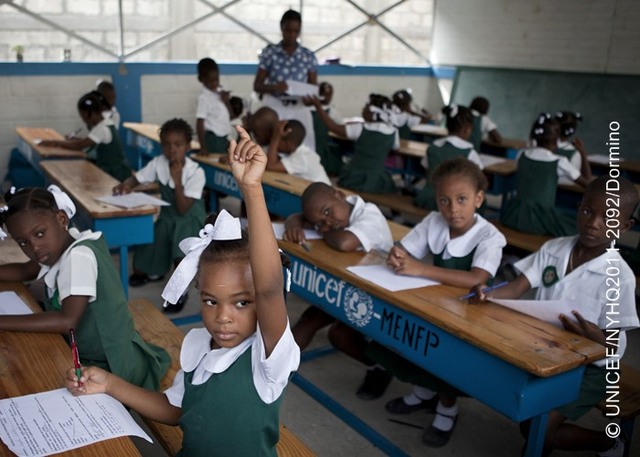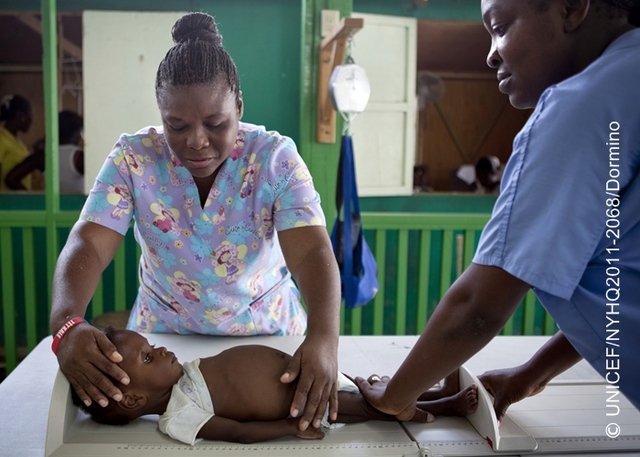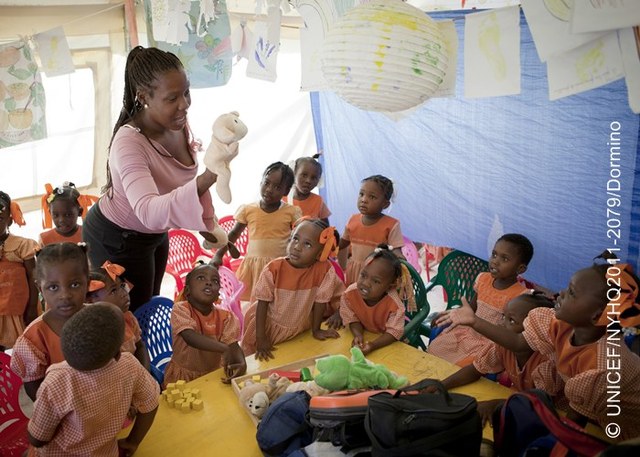Two years after earthquake, little victories for children in Haiti recovery – UNICEF
2012-01-11
Thanks to the generous support of donors from the Hong Kong Committee for UNICEF and other supporters around the world, according to the report, UNICEF has helped more than 750,000 children to return to school and some 80,000 of them are now attending classes in 193 safe, earthquake-resistant, semi-permanent schools constructed by the organisation. Over 120,000 children enjoy structured play in one of the 520 child friendly spaces. More than 15,000 malnourished children have received life-saving care in 314 therapeutic feeding programmes supported by UNICEF. And 95 rural communities have launched new programmes to improve sanitation.



“There is evidence of little victories everywhere, although serious gaps and inadequacies in Haiti’s basic governance structures remain,” said Françoise Gruloos-Ackermans, UNICEF’s representative in Haiti. “Make no mistake: the country remains a fragile state, beset by chronic poverty and under-development. Its weak institutions leave children vulnerable to shocks and the impact of disaster.”
The report notes that with 4,316,000 children under 18, most of them still only have limited opportunities for survival, development and protection. Although they begin 2012 with a long-awaited new government and national budget, children are affected by the various challenges which remain for a country where the scars of disaster are still visible on the infrastructure, institutions and social systems. More than 500,000 individuals still shelter in over 800 different displacement sites across the earthquake-affected area. Some 77 per cent were renters before the earthquake, meaning most have no homes to return to. An outeak of cholera in the earthquake’s wake continues to place an additional burden on already severely limited infrastructure and services.
“The country will need strong and steadfast support to overcome the challenges it still faces,” said Gruloos-Ackermans. “While the death toll and destruction from the earthquake were unmatched in modern times, the resources mobilised in the wake of disaster were also exceptional,” she added. “Together they present a ‘once a lifetime’ opportunity to set Haiti on a course that arrests and reverses decades of degradation and mismanagement.”
With its on-going commitment to direct its funds towards who need them the most, over two years, UNICEF has directed more than HK$2.7 billion (US$351 million) for earthquake relief and recovery operation. However, funding gaps still remain. “We are glad to see Haiti is not just in recovery, but is also on the cusp of making real, historic change for children at the two year mark after the earthquake,” said Ms Irene Chan, Chief Executive of Hong Kong Committee for UNICEF, “but we need to remember many children are still in danger of left behind, and need our support to meet their needs of survival, development and protection.”
UNICEF is appealing for HK$187.2 million (US$24 million) globally for immediate humanitarian needs in 2012 to support vulnerable children through five key projects in health, nutrition, water and sanitation, education, and child protection. Another HK$234 million (US$30 million) is needed for longer term development assistance. Donation hotline for the Haiti Earthquake Relief and Recovery: 2833 6139.
Keeping children safe, healthy and learning is a mutual goal. UNICEF and a wide range of partners are working together to innovate, problem-solve and generate momentum to lead to a sustainable future for the children of Haiti. Your continued support is crucial to our work.
Please click here to download the Children of Haiti: Two Years After report Please click here to download the photos in this press release.









